
Judge Peter Tomka, center, president of the International Court of Justice, delivers its verdict in The Hague, Netherlands, Monday March 31, 2014. “The court concludes that the special permits granted by Japan for the killing, taking, and treating of whales ... are not for purposes of scientific research”, Tomka said. The International Court of Justice is ruling Monday on Australia's challenge against Japan for whaling in Antarctic waters. (Photo by Phil Nijhuis/AP Photo)
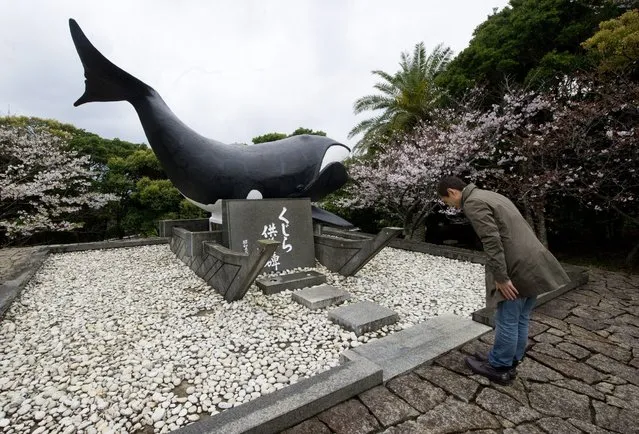
The image made available on 31 March 2014 shows a tourist praying to the spirit of whales at a shrine in Taiji city, Wakayama prefecture, Japan, 29 March 2014. Following the release of the Academy Award winning documentary “The Cove” which depicts the dolphin whaling practices of the local fishermen, the local residents received global outcry. Faced with a dwindling dolphin hunting economy the local citizens are exploring new ways of revenue through tourism. (Photo by Everett Kennedy Brown/EPA)
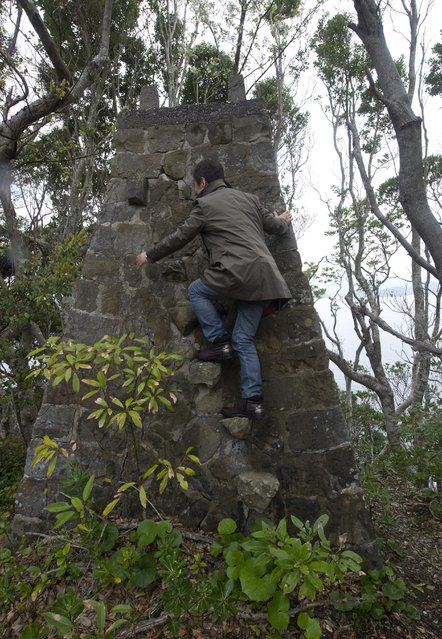
The image made available on 31 March 2014 shows a tourist climbing an abandoned whale watch tower in Taiji city, Wakayama prefecture, Japan, 29 March 2014. (Photo by Everett Kennedy Brown/EPA)

In this March 27, 2014 file photo,a shopper walks past a whale meat specialty store at Tokyo's Ameyoko shopping district. The International Court of Justice on Monday, March 31, 2014, ordered a temporary halt to Japan's Antarctic whaling program, ruling that it is not for scientific purposes as the Japanese had claimed. Australia had sued Japan at the U.N.'s highest court for resolving disputes between nations in hopes of ending whaling in the icy Southern Ocean. (Photo by Shizuo Kambayashi/AP Photo)
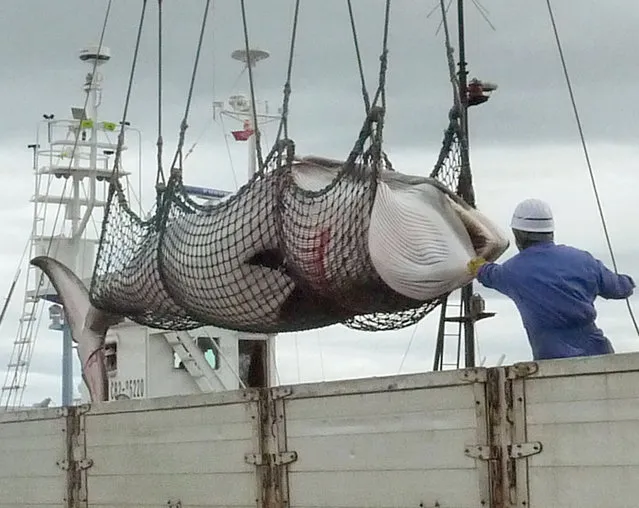
In this September, 2013 photo, a minke whale is unloaded at a port after a whaling for scientific purposes in Kushiro, in the northernmost main island of Hokkaido. (Photo by AP Photo/Kyodo News)
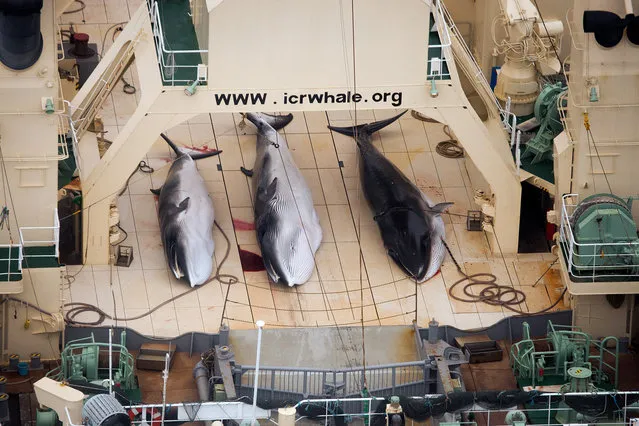
In this file photo taken on Sunday, Jan. 5, 2014 and supplied by Sea Shepherd Australia on Monday, January 6, 2014, three dead minke whales lie on the deck of the Japanese whaling vessel Nisshin Maru, in the Southern Ocean. The International Court of Justice is ruling Monday on Japan's whaling program in Antarctic waters, in a case brought by Australia. Japan hunts around a thousand mostly minke whales annually in the icy waters of the Southern Ocean as part of what it calls a scientific program. Australia and environmental groups say the hunt serves no scientific purpose and is just a way for Japan to get around a moratorium on commercial whaling imposed by the International Whaling Commission in 1986. (Photo by Tim Watters/AP Photo/Sea Shepherd Australia)
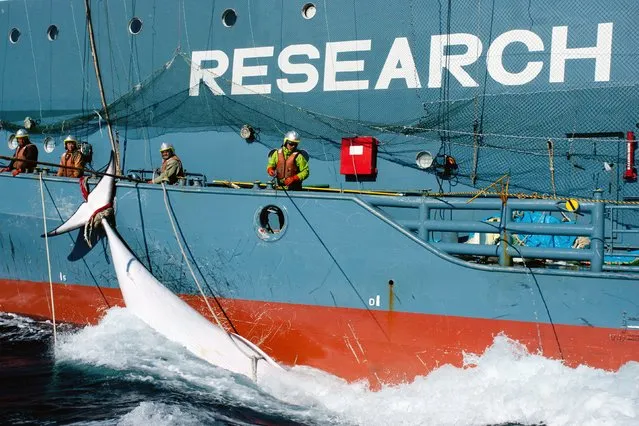
This file handout photo taken on February 15, 2013 and received on February 18 from Sea Shepherd Australia Ltd. shows Japanese whaling fleet's harpoon vessel Yushin Maru No. 2, with a minke whale in the Southern Ocean. The UN's top court on March 31, 2014 ordered Japan to end its annual Antarctic whale hunt, saying in a landmark ruling that the programme was a commercial activity disguised as science. Japan responded by saying it would respect the International Court of Justice order to end its annual Antarctic whale hunt, despite “deep disappointment” with the landmark decision. (Photo by Glenn Lockitch/AFP Photo)

This file photo taken on June 25, 2008 shows Japanese fishermen cutting up blocks of meat from a 10m-long bottlenose whale, slaughtered at the port of Wada in Minami-Boso, Chiba prefecture, east of Tokyo. (Photo by Yoshikazu Tsuno/AFP Photo)
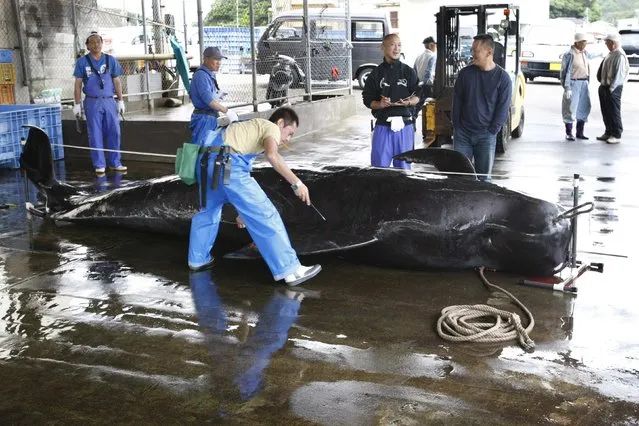
A captured short-finned pilot whale is measured by fishery workers, including Fisheries Agency employees, at Taiji Port in Japan's oldest whaling village of Taiji, 420 km (260 miles) southwest of Tokyo, in this June 4, 2008 file photo. Japan's whaling programme in seas near Antarctica is not for scientific purposes, judges at the U.N.'s highest court ruled on March 31, 2014, agreeing with Australia that Tokyo should revoke permits to catch and kill whales for research purposes. (Photo by Issei Kato/Reuters)
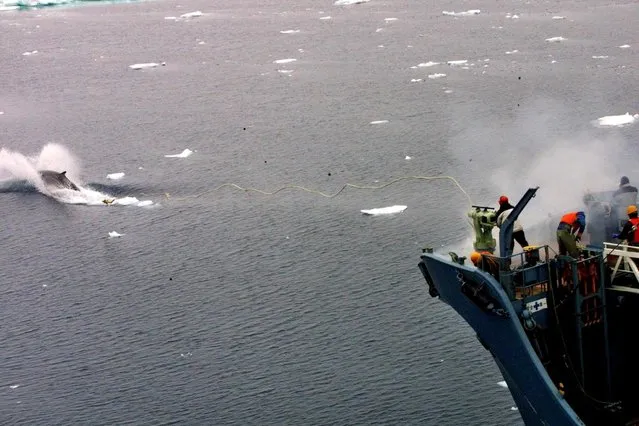
A file handout photo dated 16 December 2001 and made available by Greenpeace, showing a whale catcher ship Kyo Maru 1, using a harpoon to catch a whale in Southern Ocean. (Photo by Jeremy Sutton-Hibbert/EPA)
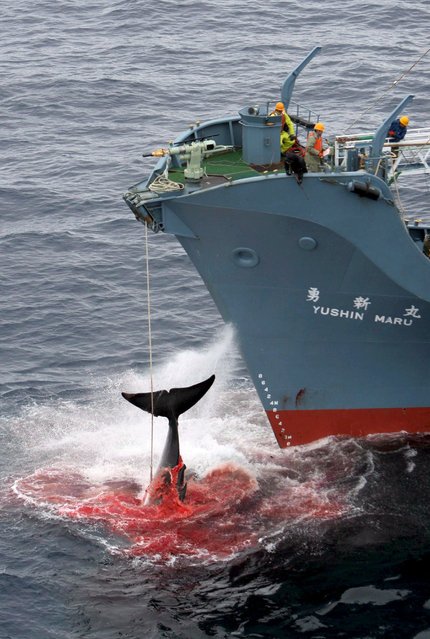
A file photograph dated 07 January 2006 and released by Greenpeace, showing the Yushin Maru, a factory ship in a Japanese whaling fleet, injuring a whale with it's first harpoon attempt. A UN court in The Hague on 31 March 2014 halted Japan's much-criticized whaling programme, ruling that it contravenes a 1986 moratorium on whale hunting. Japan must end its 'research whaling' programme, the International Court of Justice (ICJ) said. Japan said the programme was for scientific research and permitted under international conventions. Australia had brought the case to the ICJ in 2010, charging that Japan was breaching international law by killing hundreds of whales every year for commercial purposes. Japan was “deeply disappointed” by the ruling, an unnamed government official was quoted by the Kyodo News agency as saying. But the official said Japan would stand by the ruling. (Photo by Kate Davison/EPA)
01 Apr 2014 08:38:00,
post received
0 comments
